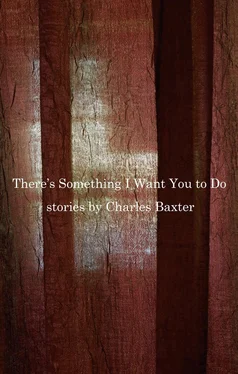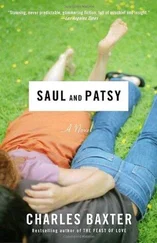He ambled down Second Street past the Mill City Museum, facing Mill Ruins Park, where a grain mill had exploded a century ago and the rubble had been left more or less as it once was, for tourists to gawk at. The location was billed as the Cradle of Carbohydrates, and indeed the flour for American bread had been shipped out of here for decades: Gold Medal flour, Pillsbury’s Best, all of them, although not anymore, manufacturing having gone global in search of cheap uninsured labor. The light had a peculiar shellacked quality this evening, with a surface glitter and sheen, as if designed for a movie. He made his way to the Stone Arch Bridge, built of limestone and granite in 1883 for use by the Great Northern railway. The Empire Builder himself, James J. Hill, had seen to its construction. Grain from the farms of the upper Midwest had arrived here on his railroad, had been stored in his silos along the river, and had been milled with the power of the Mississippi River at St. Anthony Falls. The riffraff railroad workers, their jobs finished, would drift toward the whorehouses and bars on Washington Avenue, but the riffraff had disappeared decades ago, along with their jobs, and Washington Avenue, following urban renewal, had gone upscale and pricey and was now full of spoiled and contemptible young professionals. Dr. Jones had almost seen the ghosts of the old workers, those tough sooty characters. He was very close to that realm. Tonight, before crossing the river, he took out his cell and called his wife, Susan, to say that he would be late in arriving home, but she had already gone to bed, and the doctor ended up speaking to their antique answering machine, the one with the microcassette. The doctor loved spunky defunct technologies. After having decided to stay on this side of the river, he chose a park bench in shadow some distance away from a sleeping bum stretched out on a bench next to the bum’s cherished bag of discarded aluminum cans. The doctor sat and closed his eyes. He felt himself falling into the other world.
—
When he bothered to turn to his right, he noted that a silhouette had materialized next to him, the famous outline of the old filmmaker encased in layers of fat. The director’s sadness and loneliness drifted up from his bulk like a corpulent mist in the still air. In his right hand he held a ghost cigar that produced ghost smoke. He wore a spotless dinner jacket, although he gave the impression of having been in the park for years, sitting there exposed to the elements. “I was wondering who it would be this time,” Dr. Jones said. “But somehow I never expected to see you of all people here. Didn’t they let you in? To heaven, or whatever they’re calling it now…?”
“Good evening,” the director said, bending slightly toward Dr. Jones out of a habitually polite formality. His voice had the familiar sonorous rumble, mixed with audible memories of his Cockney upbringing. His face had an odd phosphores  cence. “No, they didn’t let me in. Not as yet. The rules are quite complex, you see. One must wait. There are pages of rules written with blood mixed in ink, thick volumes of these rules stretching from the floor to the ceiling, which is way up there, so high that no applicant has actually seen it. You can’t imagine a room without a visible ceiling, and yet it must exist. Spiritual exercises are required, of a sort not dreamed of by the Jesuits of my youth. Those Jesuits would whip a boy’s upraised hands, palms out, to intensify the pain. They enjoyed cruelty, some of those Jesuits,” the old man said, with a trace of envy mixed with bitterness. “They were very clever in those days: they liked the boys to cower. They quite enjoyed it. It is a form of control, you understand, to cause someone to cower in fear. Fear supplied the voltage of their faith, and fear became their métier. So I was trained by masters. But as it turns out, one has to overcome…c
cence. “No, they didn’t let me in. Not as yet. The rules are quite complex, you see. One must wait. There are pages of rules written with blood mixed in ink, thick volumes of these rules stretching from the floor to the ceiling, which is way up there, so high that no applicant has actually seen it. You can’t imagine a room without a visible ceiling, and yet it must exist. Spiritual exercises are required, of a sort not dreamed of by the Jesuits of my youth. Those Jesuits would whip a boy’s upraised hands, palms out, to intensify the pain. They enjoyed cruelty, some of those Jesuits,” the old man said, with a trace of envy mixed with bitterness. “They were very clever in those days: they liked the boys to cower. They quite enjoyed it. It is a form of control, you understand, to cause someone to cower in fear. Fear supplied the voltage of their faith, and fear became their métier. So I was trained by masters. But as it turns out, one has to overcome…c  ertain tendencies. As at one time I was a director, now I am directed. Tell me, have you ever thought about suspense?”
ertain tendencies. As at one time I was a director, now I am directed. Tell me, have you ever thought about suspense?”
“Your specialty,” the doctor said.
“Yes, once.” The director nodded sadly, out of a bottomless melancholy. “All that caring about what happens next.” He waited. “Now nothing happens next.” He took a puff from his cigar, and the exhaled smoke formed itself into the shape of a cat, which sauntered away in the night air.
“Why do they have you sitting out here, night after night? For months? Years?”
“Penitence,” the director said. “I sit in the rain and snow observing the river. But that is not our subject. We were talking about suspense.” The director looked over at Dr. Jones. “You could lose some weight,” he said with a ghostly smile. “For the lifeboat movie I invented a nonexistent weight-reduction drug, Reduco, that you might want to try. But, yes, we were talking about suspense. For example, that homeless man over there—”
“Wait a minute,” the doctor said. “How can I try Reduco if it doesn’t exist?”
“The same way that you watch a movie about people who never walked the Earth. You swallow a pill containing dreams. Please don’t interrupt. Anyway, that man who looks like a bum is actually in flight from people who are pursuing him for reasons that I shall disclose once I think of them. He is in disguise. He merely looks like a bum. Underneath the shabby clothes and three-day growth of beard is Cary Grant. Perhaps Cary Grant has possession of some secrets related to international negotiations, but I believe it is more likely — yes, indeed I can now see it — that through a case of mistaken identity our friend here was targeted as a terrorist guilty of terrible, malicious sabotage that resulted in the darkening of an electrical grid covering much of the north-central United States. An accused saboteur, his face in all the newspapers. Did you know how easy it is to disable a nuclear reactor? No? A few broken valves, a bit of sand…And so here he is, our bum, hiding out, disguised, on the banks of the Mississippi River, accompanied by his grocery cart and bag of aluminum cans. But over there, just upstream, a mile away from where we sit, the true terrorist, whom we shall call the Arab, approaches, gripping his knife, intent on murder.” The old man paused, savoring the doctor’s interest. “The Arab approaches our scene with his knife blade out. The sharpened knife blade reflects the streetlight; it shines. And now misty rain begins to fall. The Arab has already killed others, in one instance just this morning at the Minneapolis Farmers Market in broad daylight, so that the victim’s blood splashed all over the cauliflower and the yellow squash. Blood splattered everywhere on the produce, quite a mess to clean up. There will be a chase across the river, through the hydroelectric plant right down there, ending in the caves far underneath us, below, the caves of the Mississippi, the endless caves, where the Girl is tied up. I haven’t mentioned the Girl, but she’s down there now. Imagine her: a blond beauty knotted up with hemp. Imagine the rope tight around her wrists and her ankles. We already know about her, don’t we? Beneath our feet resides an underground labyrinth, and there she is, our blonde. Her cries are piteous. We desire her, like oysters. An endless labyrinth. Cary Grant finds her, but the Arab approaches them both, with his knife. The movie will go on for days.”
“That doesn’t sound like you.”
“Well, what does sound like me?”
The doctor thought for a moment. “ ‘Mother…’ ” he recited. “ ‘Mother…what is the phrase?…Mother isn’t quite herself today.’ ” The director nodded. After a moment, Dr. Jones thought of another line. “ ‘And you know what else, Doctor? I don’t think Mozart is going to help at all.’ ” This time the old man’s face took on a downcast expression. The line seemed to cause him pain. “ ‘That plane’s dustin’ crops where there ain’t no crops,’ ” the doctor recited more happily, getting into the spirit of things.
Читать дальше

 cence. “No, they didn’t let me in. Not as yet. The rules are quite complex, you see. One must wait. There are pages of rules written with blood mixed in ink, thick volumes of these rules stretching from the floor to the ceiling, which is way up there, so high that no applicant has actually seen it. You can’t imagine a room without a visible ceiling, and yet it must exist. Spiritual exercises are required, of a sort not dreamed of by the Jesuits of my youth. Those Jesuits would whip a boy’s upraised hands, palms out, to intensify the pain. They enjoyed cruelty, some of those Jesuits,” the old man said, with a trace of envy mixed with bitterness. “They were very clever in those days: they liked the boys to cower. They quite enjoyed it. It is a form of control, you understand, to cause someone to cower in fear. Fear supplied the voltage of their faith, and fear became their métier. So I was trained by masters. But as it turns out, one has to overcome…c
cence. “No, they didn’t let me in. Not as yet. The rules are quite complex, you see. One must wait. There are pages of rules written with blood mixed in ink, thick volumes of these rules stretching from the floor to the ceiling, which is way up there, so high that no applicant has actually seen it. You can’t imagine a room without a visible ceiling, and yet it must exist. Spiritual exercises are required, of a sort not dreamed of by the Jesuits of my youth. Those Jesuits would whip a boy’s upraised hands, palms out, to intensify the pain. They enjoyed cruelty, some of those Jesuits,” the old man said, with a trace of envy mixed with bitterness. “They were very clever in those days: they liked the boys to cower. They quite enjoyed it. It is a form of control, you understand, to cause someone to cower in fear. Fear supplied the voltage of their faith, and fear became their métier. So I was trained by masters. But as it turns out, one has to overcome…c 










